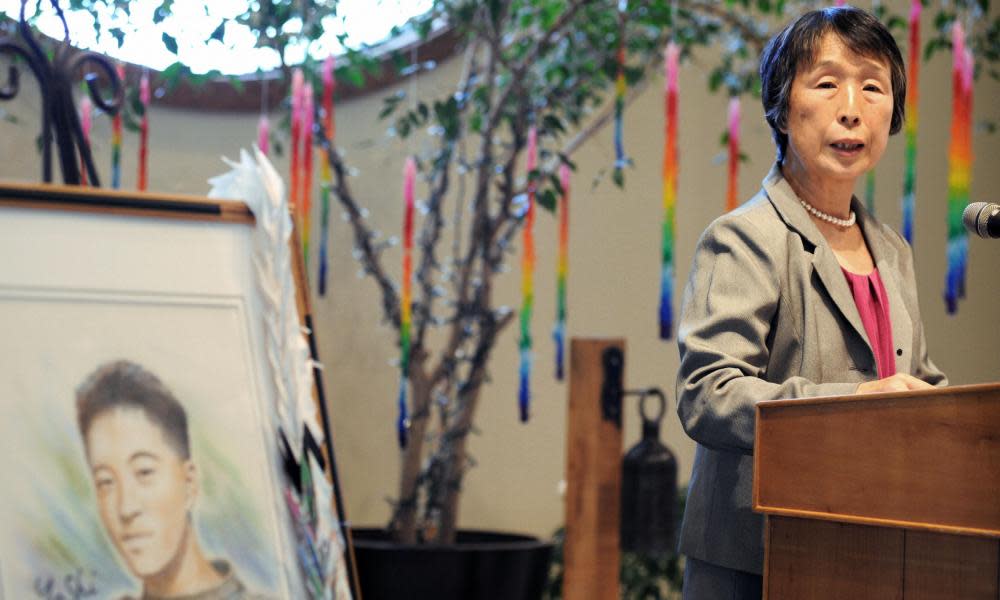Mother of Japanese teenager shot dead in US in 1992 continues gun control fight

Two and a half months after Yoshi Hattori arrived in the US, he made a fatal mistake on his way to a Halloween party.
When the 16-year-old Japanese exchange student approached the wrong house in Baton Rouge, Louisiana, he was shot dead by the homeowner, who claimed to have feared for his life.
Rodney Peairs was found not guilty of manslaughter, in a case seen as a forerunner of America’s debates over “stand your ground” laws, which allow for the use of deadly force in self-defense in public – even when that could be avoided by retreating instead. Critics call them “shoot first” laws.
Yoshi’s death in 1992 might have fallen out of the headlines if it weren’t for the tireless efforts of Yoshi’s parents, who went on to become active campaigners for gun law reform in the US.
This Saturday, Yoshi’s mother, Mieko Hattori, will again make a call for action in the US when she speaks at a March for Our Lives rally in the Japanese city of Nagoya.
She wants to show solidarity with Florida’s Marjory Stoneman Douglas high school students who have pleaded for “sensible gun control” after the 14 February shooting in which 17 people were killed and 17 wounded.
“I was moved by the high school students challenging the government on the gun control issues,” she told the Guardian.
“I felt something was changing at the bottom. I hope adults who have common sense take actions with them for the US to be safer country. The future is for the young.”
Mieko Hattori and her husband Masaichi Hattori added in an emailed statement: “Adults should treasure the wish of young people for their peaceful future.”
After Yoshi’s death, his parents gathered about 1.7 million Japanese and 250,000 American signatures on a petition calling for action. President Bill Clinton met the Hattoris in November 1993, and their campaign helped to build momentum for the Brady Handgun Violence Prevention Act, which introduced background checks for people buying firearms.
The Hattoris still recall Yoshi’s fascination with US culture – and his hope that America might one day become his “second home”. His student exchange experience was meant to last for a year, but was cut short after just two and a half months.
During his trial, Peairs testified that Yoshi – dressed as John Travolta in Saturday Night Fever for the Halloween party – didn’t stop approaching when Peairs said “freeze”.
Peairs claimed he had used his .44 Magnum equipped with a laser sight in self-defence when Hattori failed to stop. It was unclear whether Hattori understood Peairs’s command to “freeze!”
The case attracted wide coverage in Japan, where guns laws are much stricter than in the US.
In an attempt to build something positive from the tragedy, the Hattoris set up a scholarship scheme bringing high school students from the US to Japan on exchange. It was funded by proceeds from a civil lawsuit against the shooter.
So far, 25 students have travelled to Japan for placements with a homestay family for about a year at a time. They commute to local schools and learn about Japanese customs.
“They experience Japan life with no fear of guns,” the Hattoris said. “They learn we Japanese do not have the idea to protect ourselves by guns but are safer than the USA. Of course it is not perfect safety as there are some violence from illegal guns, [but] through their experience here in Japan we hope they could look over the situation of the US.”
In 2014, there were just six gun-related deaths in Japan, a country of 127 million people, according to figures compiled by GunPolicy.org, a resource affiliated with the University of Sydney, Australia. In the same year there were 33,599 gun-related deaths in the US.
It is estimated that civilians in Japan hold a total of 710,000 guns, including legal and illegal weapons. The equivalent estimate for the US, according to GunPolicy.org, is between 270m and 310m.
The Hattoris are sensitive to differences between Japanese and American attitudes towards guns. They said they understood many Americans viewed guns as a form of self-protection, but added an important caveat: “If they desire to have guns at home and in their areas they have to accept stronger gun control laws because it is very easy for we human beings to make a mistake.”

 Yahoo News
Yahoo News 
